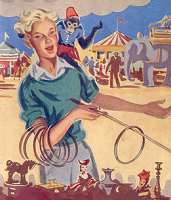It's Different!
Article by Nakul Datar (April 3, 2005)
Enid Blyton is great at narrating a mystery/adventure story, and deserves the title of 'Mistress of Mystery'. However, she seldom spends more than a couple of pages describing a character, and the character does not undergo significant development throughout the series. To be fair, if she were to give each character their own chapter, we would have five (or six, or seven, depending on the series) less chapters of ginger beer, cakes, ice creams and macaroons—and this we cannot accept!
Of all Blyton's popular characters, from numerous series, she treats two of them a little differently to the rest. The Famous Five's Georgina (oops, sorry, George) is one; Barney is the other. Barney's character starts out as a good-natured circus boy, but as the books progress, we get to see other qualities he possesses or comes to possess. His diffidence and humility are a marked facet of his personality, but as he meets his father, he is shown to gain more confidence. We find out a lot about his background and his emotional makeup. Barney's emotions as described in The Rubadub Mystery are very realistic, and this kind of character depth is rare in most children's books of the time.
Secondly, Blyton's books rarely contain elements of the real world. But two books in the Barney Mystery series seem to be inspired by current events in Blyton's day—The Rat-A-Tat Mystery and The Rubadub Mystery. While Blyton has mentioned the war in a few books here and there, it is usually just that: a mention, with no real bearing on the plot. As far as I know, apart from The Valley of Adventure and The Adventurous Four, The Rubadub Mystery is the only other book to be tied-in with an ongoing war.
A third point that caught my attention was that the children in this series do not always seem eager to tackle a mystery, especially if it seems dangerous. That does not mean this is a group of Annes from the Famous Five (I'm not complaining about Anne, I love her as she is), but rather that the children seem more close to real life. There is no 'outright leader' like Julian (Famous Five), Peter (Secret Seven) or Fatty (Five Find-Outers). Instead, decisions are made on consensus, and even the idiotic Snubby plays a significant part in the mystery-solving. There is also a lot more equality between the brother-sister pair of Roger and Diana, with both of them sharing the laurels equally.


